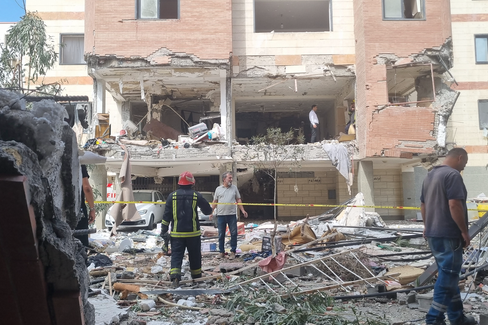Post-war explosions, smoke plumes addle Iranians

Recent fires and explosions across Iran have captured widespread attention and many remain skeptical of official explanations attributing them to routine accidents, especially gas leaks.

Recent fires and explosions across Iran have captured widespread attention and many remain skeptical of official explanations attributing them to routine accidents, especially gas leaks.
Since a June 24 ceasefire ending a punishing war with Israel, a string of blasts and fires has struck residential buildings, airports, and sites described as commercial warehouses in cities including Tehran, Karaj, Qom, Mashhad and Tabriz.
In every case, government officials and state media have rushed to downplay the events, describing them as isolated incidents caused by routine factors.
Israeli air strikes and drone attacks during the 12-day war killed hundreds of Iranian military personnel and nuclear scientists, along with with hundreds of civilians.
The most recent explosion occurred at a residential complex in Qom, injuring seven people.
Footage from the scene showed extensive damage to ground- and first-floor apartments as well as nearby vehicles. Authorities attributed the blast to a gas leak.
That same day, additional incidents were reported: explosions and fire near Karaj; a fire at Mashhad Airport; a large blast in a desert area near Semnan; an explosion in Tabriz; and a fire in a commercial building in central Tehran.
No immediate explanations were offered for most. A Civil Aviation Organization official claimed the smoke at Mashhad Airport was due to "planned burning of weeds."
Government blames media panic
Iranian officials insist the incidents are routine and accuse foreign-linked media of spreading fear. Even minor events now trigger public suspicion.
When a car caught fire on a Tehran motorway on Monday, some compared it to Israeli operations targeting Hezbollah vehicles—despite no visible signs of an attack.
Speaking to the IRGC-linked Fars News Agency, an unnamed official accused “anti-Revolutionary media and Zionist-linked accounts” of connecting natural events to war in order to cause panic.
“People should not worry about this type of news fabrication,” he said.
But with each blast, more Iranians appear to be tuning out the official narrative—and asking harder questions.
Public unease and satire
“Every time something blows up, they say it’s a gas leak,” one user posted on X. Others shared footage with sarcastic captions questioning the frequency of incidents and the speed of official responses.
Satire has become a vehicle for disbelief.
After a July 10 explosion at a residential tower in Tehran’s Chitgar district, an X user named Mehran joked: “Call the Tehran gas company right now and someone picks up saying, ‘Shalom, how can I help you?’”
During the recent 12-day conflict, Israel targeted Iranian military figures and nuclear scientists at their homes.
In prior years, explosions at sensitive sites were later revealed as acts of sabotage—including the 2020 assassination of nuclear official Mohsen Fakhrizadeh with a remote-controlled weapon.
Some Iranian users on social media have been joking that the state may be deliberately turning a blind eye to Israeli involvement—because officially acknowledging it would compel a response and risk dragging the country back into war.
Others see it in darker terms, comparing Iran to Lebanon and its mounting vulnerability.
“It’s gotten to the point where smoke suddenly rises from Vanak (Square) at noon, someone says it was an explosion, someone else says it was nothing. But no one really asks what happened anymore; people are used to it,” wrote a popular user going by the name @NR2OH on X.
“Tehran has become like Beirut: anything can blow up at any moment, but life carries on like nothing happened,” they added.